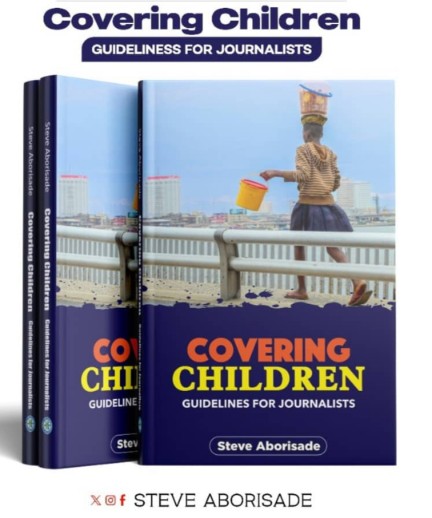The Senior Advocacy & Marketing Manager, AIDS Healthcare Foundation (AHF), Nigeria, has published a Book for journalists reporting children-related issues.
The book titled “Covering Children: Guidelines for Journalists” is expected to help journalists improve their understanding of how to report issues affecting children.
Aborisade, who is a Child and Media Development Advocate, noted that he has seen both the good and bad sides of media reporting, arguing that the media is a powerful tool that can be used to bring attention to important issues and drive change.
He pointed out that, “In my current work with the AIDS Healthcare Foundation (AHF) and my past experiences with Projekthope as well as Wole Soyinka Investigative Reporting Award (WSIRA) now Centre for Investigative Journalism (WSCIJ). I have seen just how crucial responsible storytelling is.
“I know how powerful the media can be in bringing attention to important issues and driving change. I have seen how the media can rally support for those who need it most. And, I have also seen how easily this power can be misused, leading to the exploitation of children who cannot protect themselves.
“This work thus assumes that the media plays a huge role in shaping how we see things, and rightly so, especially when it comes to stories about children. It is on this premise that this book builds on what I explored in my Master’s thesis at the University of Haifa, where I studied the International MA Program in Child Development at the Faculty of Social Sciences, and looked at how issues of identity and trauma are presented, especially for those who are vulnerable.”
While stating that the book that would help journalists in their daily reportage on issues of children could be accessed on https://selar.com/7l1075, he called for support from all and sundry to change the narrative.
Also commenting on the book, Prof Mojúbàolú Okome, a Professor of Political Science, Brooklyn College, CUNY, New York, said the book was necessitated by different challenges faced by journalists in reporting on children.
She explained that the book would serve as a guide for journalists on ethical reporting about children.
Okome further noted that“It (book) emphasises responsible storytelling and considers the impact of media on children, who are seen as vulnerable due to their limited understanding of the consequences of media exposure.
“The guide advocates a trauma-informed approach, prioritising the child’s well-being over the story. It also highlights the need to balance the public’s right to know with the protection of children’s privacy and dignity.”
Furthermore, she observed that “They (children) can be harmed, stigmatised, and exploited through irresponsible reporting. Maintaining the privacy and confidentiality of children is critical. This includes not disclosing details and handling sensitive information with discretion. Journalists need to be aware of the long-term effects of media exposure on a child’s life.
“Therefore, journalists should avoid portraying children negatively and be aware of potential retribution or psychological harm due to their reporting.”
Lanre Idowu, Founder-Trustee, Diamond Awards for Media Excellence Trust Fund, in his remarks said Aborisade deserves appreciation for mainstreaming the place of ethics as the oxygen that fuels individual and institutional credibility. Indeed, without public trust, journalism is no more than a dangerous, ego-tripping pastime.
“Contextualising ethics in the way children’s issues are addressed indicates the author’s sensitivity to the place of the child in the orderly development of society. Here’s a book stressing the child matters as a member of society and an agent of development with rights, who deserves attention, affection, and respect. It is a welcome resource that equally holds that good journalism matters; it certainly adds value to the wider discussion on the ends that media scrutiny and engagement should serve in society.”
Describing the book as a must-read for ethical and impactful child-centric journalism, the Executive Director, Development Communications Network; Chief Editor, Nature Africa, Akin Jimoh, said, the book provides “a roadmap for ethical, responsible, and compelling reporting that truly represents young lives.
“In a media landscape where children’s stories are hardly reported and are often shaped by adult voices, covering children’s challenges journalists and media organisations are challenged to rethink their approach.
“From navigating children’s rights and privacy to striking the balance between storytelling and advocacy, each chapter offers practical insights and real-world case studies. Whether you’re covering vulnerable groups, tackling ethical dilemmas, or adapting to digital journalism’s rapid pace, this guide pushes for a future where children are not just subjects—but active participants in the narratives that shape them.’’
“More than just a handbook, Covering Children: Guidelines for Journalists is a call to action: to tell stories that inform, inspire, and create real change with a culturally protective mien.”
On his part, Lekan Otufodunrin, Executive Director, Media Career Development Network, said, “As an advocate of ethical media practice, I find Covering Children: Guidelines for journalist as a very useful and practical guide for getting journalists not only to understandthe intricacies involved in reporting children issues, but the need to be more professional, sensitive, thoughtful and compassionate.
“The book, with relevant insights, comprehensively underscores the need for child-centric journalism based on applying necessary skills to elevate reporting of children beyond the present level where many journalists unconsciously do irreparable damage to children through their reports.
“Journalists who need more explanation on the provision of the Code of ethics for journalists on covering of children and minors, that requires that they should not identify, either by name or picture, or interview children under the age of 16 who are involved in cases concerning sexual offences, crimes, rituals, or witchcraft whether as victims, witnesses, or defendants, will find this book very insightful.” End.














